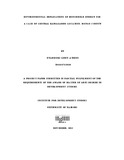| dc.description.abstract | The production and consumption of any type of biomass fuel has environmental impacts and it is important to ensure that the exploitation of these fuels is sustainable. This paper investigates the environmental implications of household energy use in Central Kamagambo location of Rongo County. The specific objectives of the study were to: Examine existing energy consumption patterns by different households; Identify sources and factors that influence biomass energy consumption by households and analyze the effects of biomass consumption on the environment. A systematic random sampling of 100 households was obtained from the study area. The paper establishes that socio economic factors influence the choice of fuel preferred by a household. Among the socio economic factors that influence the choice of fuel include education, income (nature of employment), family size and wealth status. Other important factors that determine fuel choice and consumption among households include cost (affordability) and availability of fuels. The main types of biomass fuel frequently used are firewood and charcoal. Fire wood is mostly used followed by charcoal but this varies across the socio economic status of the households. The sustained use of these fuels was attributed to the cost implications and ease of availability.
The major sources of biomass energy were found to be the community woodlot, own farm and local market. Most of these fuels were collected and in other instances bought. The preference by households to source their energy from the community 'woodlot was because it was an open access resource. Absence of control in the use of this resource coupled with its high demand among the households renders the resource towards over exploitation and degradation. Similarly, the unsustainable harvesting, production and utilization of biomass energy has had considerable negative environmental outcomes in the study area. This is mainly attributed to the economic value attached to biomass stocking among households.
The policy implications is for the government and other stakeholders to promote strategies aimed at ensuring efficiency in the utilization of biomass energy resources by reducing the amount of fuel demanded. Secondly there is need to ensure that the amount of biomass energy resources are increasing with the increase in its demand for sustainability. This can be achieved through the promotion of afforestation, agro-forestry and tree planting programmes. There is also need for the government 'to promote joint management strategies that integrate rural energy programmes and promote technological initiatives to reduce dependence on biomass energy. | en_US |

